Samuel Chapman Armstrong of the Hampton Institute writes to Richard Henry Pratt asking for information about Indian Territory and its peoples to include in a paper for the American Missionary Association meeting in Cleveland.
1880-1889
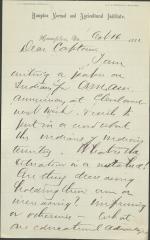
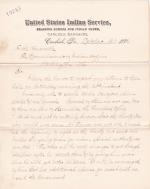
Richard Henry Pratt reports that he returned from his trip to recruit Navajo students. He notes that he only brought back 12 Navajo students rather than the allotted 20.
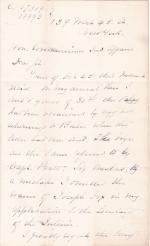
Alice C. Fletcher requests permission to enroll six Omaha students at the Carlisle Indian School. Fletcher recounts she had been fundraising to secure funds for their education and had nearly succeeded.
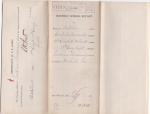
Richard H. Pratt submits this Monthly School Report for October 1882.
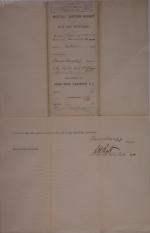
Thomas Stewarts Jr, school physician compiles the monthly sanitary report for October 1882.
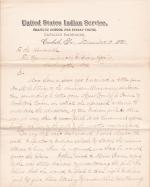
Richard Henry Pratt recommends being allowed to send eight small girls to be educated by Emily J. Bowen of Woodstock, Connecticut.
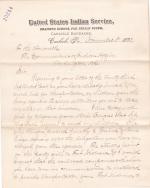
Richard Henry Pratt informs the Commissioner of Indian Affairs that he has received word that Sitting Bull refuses to send any children to Carlisle. As a result he has directed his representative to go directly to Rosebud or Pine Ridge to bring back students. He ended by saying that if there are more students desiring to come from Rosebud or…
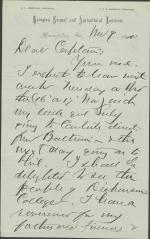
Samuel Chapman Armstrong of the Hampton Institute writes to Richard Henry Pratt with trip logistics for Armstrong's visit to Carlisle, including an expressed desire to meet with supporters at Dickinson College.
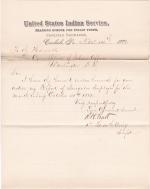
Richard H. Pratt submits a report that lists irregular employees who worked at the school during October 1882. The report includes details on compensation, position titles, race, and the number of days worked during that month.
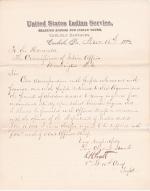
Richard Henry Pratt requests $50 worth of 3 cent stamps in order for the Carlisle Indian School to correspond with outing patrons, returned students, parents, and official inquiries.
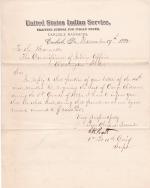
Richard Henry Pratt replies to an inquiry that the cost of recruiting Osage students for the third quarter of 1882 was $2143.96.
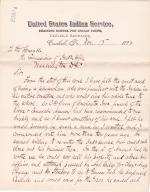
Richard Henry Pratt informs the Office of Indian Affairs that he has hired Obadiah G. Given as the Carlisle Indian School physician. Pratt details how he came to the decision as well as Given's salary.
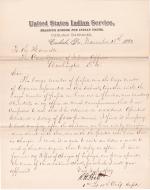
Captain Richard H. Pratt submits a report that lists new employees (Florence M. Carter, M. E. Snyder), those who have left the school (Mary Spain, Emma C. Sickels, Thomas Stewart Jr., Margaret Wilson, H. H. Shiverick), and those who have changed positions (Ella L. Patterson, Anne S. Ely). These reports include personal information about those…
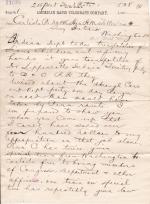
Richard Henry Pratt notifies the Department of the Interior of changes made by the Indian Department regarding changes in transportation. Pratt indicates that the Department has arranged the delegation to travel by the B&O Railroad rather than the Penn Railroad incurring additional time and costs to the Carlisle Indian School. Pratt…

J. R. Buchannan, the passenger agent for the Sioux City and Pacific Railroad, writes regarding transportation ordered for 70 students from the Rosebud Agency to the Carlisle Indian School.
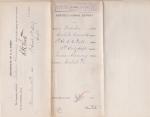
Richard Henry Pratt submits this Monthly School Report for November 1882, which includes a list of text books used for the academic education, industrial trades taught, information on the arrival of students from Pine Ridge and Rosebud Agencies, and enrollment by nation.
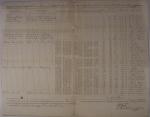
Richard H. Pratt submits a report that lists irregular employees who worked at the school during November 1882. The report includes details on compensation, position titles, race, and the number of days worked during that month.
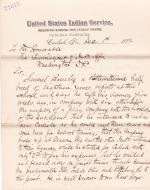
Richard Henry Pratt provides the account of Samuel Bausley, a member of the Pottawatomi Nation, who came to Carlisle on his own accord in order to enroll at the school. Pratt recommends retaining Bausley at Carlisle if his story is truthful.
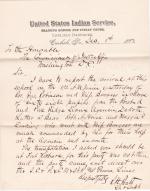
Richard Henry Pratt reports the arrival of 68 students at the Carlisle Indian School from the Rosebud and Pine Ridge Agencies.
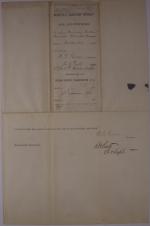
O. G. Given, the school physician, compiles the monthly sanitary report for November 1882.
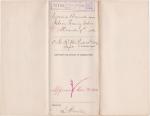
Richard H. Pratt submits a report that lists new employees (A. J. Wetzel and Lavinia Bender) as well as one who had left the school (Thomas Baird). These reports include personal information about those being hired as well as reasons for departure for those leaving.
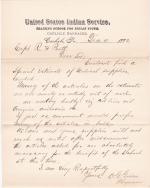
Richard Henry Pratt forwards special estimate for medical supplies in addition to a letter from the physician of the Carlisle Indian School, Obadiah Given, describing the necessity of the supplies.
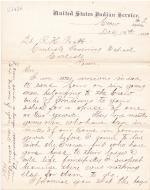
H. J. Armstrong, U. S. Indian Agent at the Crow Agency, that he wants to send a few students from the Crow Agency to Carlisle. Armstrong states that the students previously lived in his home and are now back at their camp. Pratt's response to the Indian Affairs Office is that he would be glad to take more students from the Crow Agency but only…
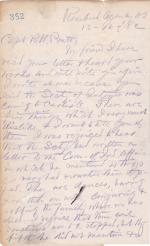
Cook writes to Richard Henry Pratt regarding Rosebud Agency and asking either for his daughter to be sent home or the funds to come visit her at Carlisle.
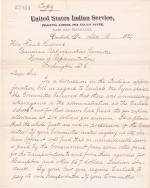
Copy of a letter Richard Henry Pratt sent to Congressman Frank Hiscock, Chairman Appropriations Committee in the House of Representatives regarding the Committee's hearing on the Carlisle Indian School's appropriation. Pratt disagrees with the idea that the school is being run in an extravagant manner and that while he can run the school on a…
